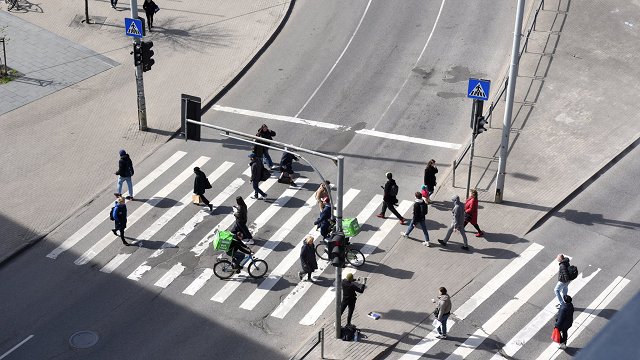The survey of young people in the Baltic was conducted by Norstat in May 2023, following an order from SEB Bank. 1,428 respondents from Latvia, Lithuania, and Estonia aged 18-29 participated.
The survey shows that in Lithuania, about a fifth of the respondents think they should receive a salary above €1,500, whereas in Estonia, it is indicated 40% of the respondents.
The survey shows that the level of the desired salary is directly affected by the level of education: 43% of young people who would already like to receive over €1,500 have obtained higher education, while 29% have secondary special education. Men are much more ambitious, with 45% of men and only 14% of women think they should receive that salary.
In response to the question of current income, more than half of respondents in Latvia indicate that they earn less than €1200 after tax: a fifth of them receive up to €500, 15% from €500 to €800, and around 22% from €800 to €1,200. At the same time, 19% of those surveyed didn't want to disclose their income levels, while 6% said they didn't have a regular income.
The fact that young people have greater ambitions and want to earn more is a hallmark of this generation, said Eva Selga, chairman of the board of the Latvian Personnel Management Association.
“Young people are not shy about speaking about their wish for higher pay. Older people, over the age of 50, 60, say – well, I don't know, I haven't thought about it yet. But in fact we all think about pay, it's important for all of us,” Selga said. “If we look at this survey, then the men are more ambitious, the women maybe a little more modest, and here's the gap that there will be discrimination between women and men in terms of pay. I believe that young people have to have ambitions. If a young person learns and invests in their education, they certainly want to live well. The question is whether the contribution that a young person will make to the employer will indeed be appropriate."
According to data from the State Employment Agency (NVA), during the first half of 2023, the NVA registered nearly 3,300 young people under the age of 24. Young people find jobs relatively quickly, but the majority have not acquired a profession, only basic or secondary education and lack the necessary skills.
“The lack of skills and education required in the labor market is one of the most important obstacles to the path for young people to employment,” NVA spokeswoman Signe Bierande explained. “We're seeing a lack of working experience, which is one of the hurdles. If we look at the professions where young people were employed, most are auxiliary workers, vendors, consultants, customer service professionals, shop vendors, waiters, shop workers, and warehouse workers."
In forecasting their earnings after five years, young people in all three Baltic States expect much higher wages than they are now. Nearly 43% of those surveyed in Latvia expect their salary to be between €1,500 and €2,500. Nearly a third, or 27%, expect income above €2,500 after taxes. In Lithuania, 21% of those surveyed expect a salary above €2,500 after five years, while 48% expect to earn between €1,500 and €2,500.
Estonia's young people, on the other hand, are far more ambitious than their future, with 36% planning to receive over €2,500 and between €1,500 and €2,500 – 50%.




























